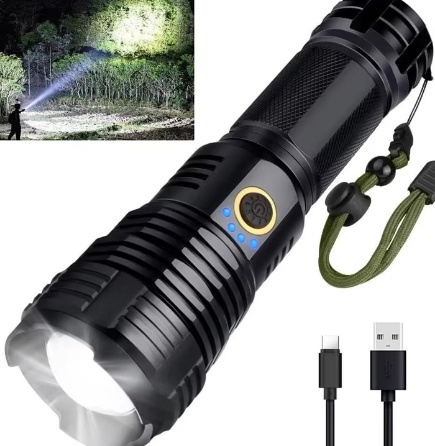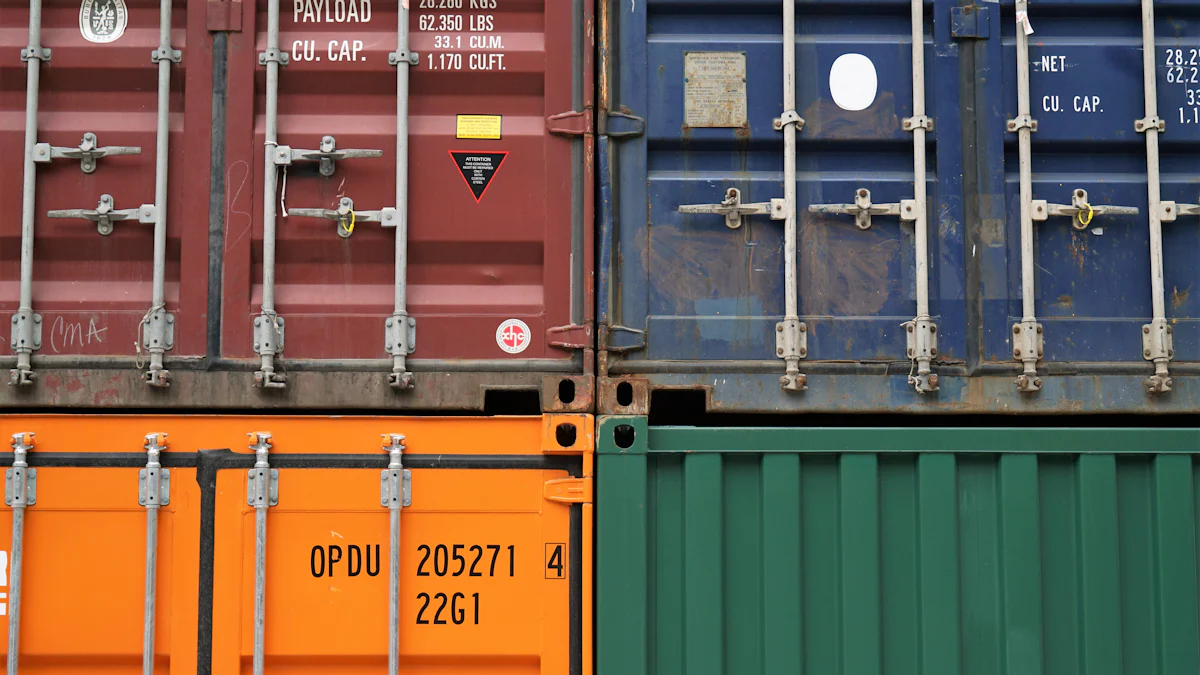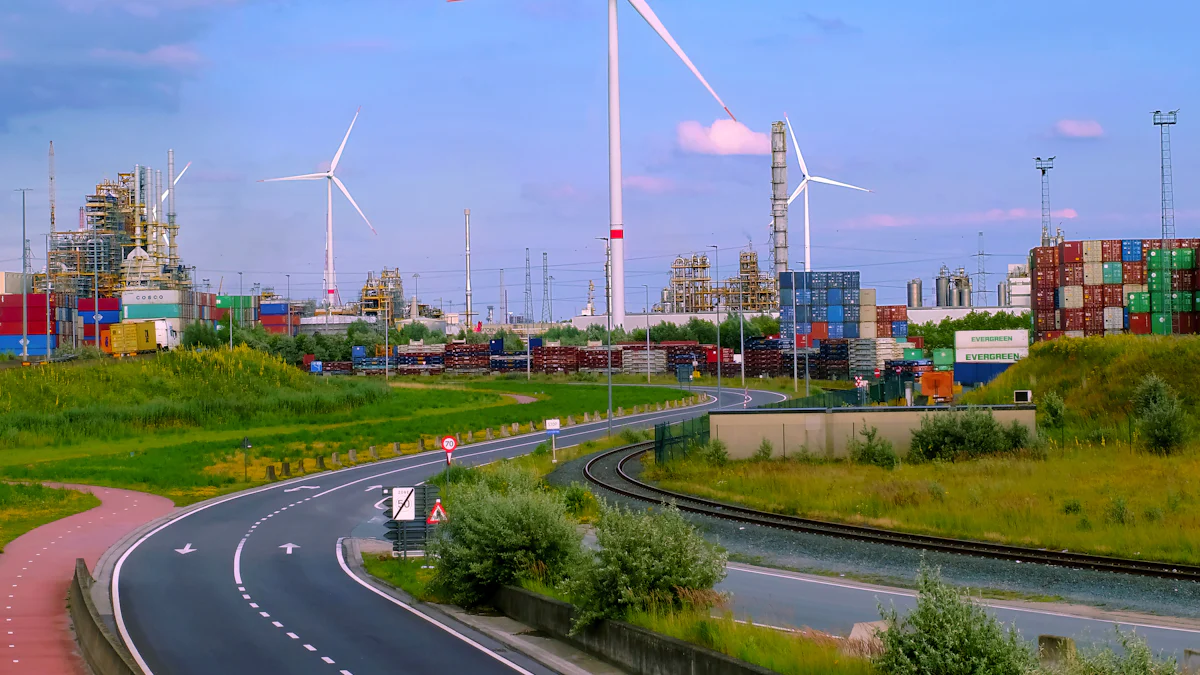Why Middle Eastern Businesses Should Prioritize Sustainable Flashlight Supply Chains

Sustainability has become a cornerstone of modern business, and why Middle Eastern businesses should prioritize sustainable flashlight supply chains is a crucial consideration. You face growing challenges like climate change, resource depletion, and economic instability. Severe weather events disrupt operations, while fluctuating commodity prices create uncertainty. These issues demand proactive solutions. By embracing sustainable practices, you can build resilience and secure long-term success.
Middle Eastern businesses hold a unique position in driving sustainable industrial development. Many companies in the region already lead by example, forming partnerships and adopting innovative practices. For instance, the Dubai Electricity and Water Authority (DEWA) has significantly reduced emissions through sustainable initiatives. This leadership inspires others to follow suit.
The flashlight industry also benefits from ethical supply chains, highlighting why Middle Eastern businesses should prioritize sustainable flashlight supply chains. Certifications like Energy Star and ISO ensure energy efficiency and safety. Ethical sourcing respects human rights and fosters transparency. By prioritizing sustainability, you not only reduce environmental impact but also enhance your brand's reputation and competitiveness.
Key Takeaways
Using sustainable flashlight supply chains helps the planet and builds trust. Eco-friendly actions can attract customers who care about the environment.
Fair labor and honest practices create trust and loyalty. Being fair and open keeps a good brand image strong.
Technology like AI and blockchain makes supply chains better. These tools track materials and cut down on waste.
Keeping supply chains local makes them faster and stronger. It can also save money and help businesses compete better.
Start small by using green materials and working with eco-friendly suppliers. Every small step toward being green leads to future success.
Understanding Supply Chain Sustainability in the Flashlight Industry

Defining Sustainable Supply Chains
Sustainable supply chains focus on balancing economic growth with social and environmental responsibility. In the flashlight industry, this means adopting practices that minimize harm to the planet while ensuring ethical treatment of workers and long-term financial stability. You can achieve this by collaborating with sustainable suppliers, adopting green technologies, and reducing waste. Engaging employees and stakeholders in these efforts strengthens your commitment to sustainability. Social and financial sustainability are equally important, as they ensure your business thrives while respecting human rights and the environment.
By prioritizing sustainable supply chain management, you create a system that benefits everyone involved. This approach not only reduces your environmental footprint but also builds trust with customers and partners. It’s a win-win for your business and the planet.
Relevance of Sustainability to the Flashlight Industry
Sustainability directly impacts how flashlights are produced and distributed. Using eco-friendly materials like recycled metals and biodegradable plastics reduces environmental harm and enhances product durability. Energy-efficient manufacturing processes lower energy consumption and greenhouse gas emissions, shrinking your carbon footprint. Waste reduction strategies, such as recycling and lean manufacturing, promote a circular economy by minimizing waste.
Sustainable supply chain management ensures responsible sourcing and efficient logistics. This means you can deliver high-quality products while supporting ethical supply chains. By embracing these practices, you position your business as a leader in sustainability and innovation.
Ethical Supply Chains and Their Importance
Ethical supply chains are essential for maintaining brand reputation and fostering customer trust. They ensure compliance with legal and ethical standards, which is crucial in today’s competitive market. Key components of ethical supply chains include fair labor practices, environmental responsibility, and transparency. For example:
Component | Description |
|---|---|
Fair labor practices | Ensuring respect, fair wages, and safe working conditions for all workers. |
Sustainability and environmental responsibility | Prioritizing eco-friendly practices throughout the supply chain. |
Allowing verification of sourcing and manufacturing processes. |
By implementing a supplier code of conduct, you can uphold these principles and demonstrate your commitment to human rights. Ethical supply chains not only align with your values but also enhance your competitiveness in the market.
Why Middle Eastern Businesses Should Prioritize Sustainable Flashlight Supply Chains
Environmental Impact Reduction
You have the power to make a significant difference in addressing environmental concerns by adopting sustainable flashlight supply chains. These practices reduce the environmental impact of your operations and contribute to a healthier planet. By using eco-friendly materials, you minimize waste and promote resource conservation. Green technologies, such as energy-efficient manufacturing, enhance operational efficiency while lowering emissions.
Reduced emissions from sustainable practices help combat climate change.
Eco-friendly materials, like recycled metals, decrease landfill waste.
Green technologies improve energy use and reduce your carbon footprint.
When you prioritize sustainability, you align your business with global efforts to protect the environment. This not only benefits the planet but also positions your company as a responsible leader in sustainable industrial development.
Economic and Operational Benefits
Sustainability offers more than environmental advantages. It also drives economic transformation and operational efficiency. By localizing supply chains, you improve responsiveness and build resilience against disruptions. This shift from traditional, linear models to flexible networks reduces costs and enhances performance. Sustainable supply-chain financing programs further help you address environmental costs effectively.
Banks now incentivize businesses to improve their ESG (Environmental, Social, and Governance) credentials. This creates opportunities for cost savings and operational improvements. Major supply chains contribute significantly to emissions, so adopting sustainability initiatives can reduce costs while meeting environmental goals. These changes give you a clear advantage in navigating market challenges.
Enhanced Brand Reputation and Market Competitiveness
Your commitment to sustainability strengthens your brand reputation and boosts your competitive edge. Consumers today value ethical supply chains and prefer businesses that prioritize sustainability. By adopting sustainable practices, you demonstrate transparency and responsibility, which builds trust with your customers. This trust translates into loyalty and long-term success.
Sustainability also enhances your market competitiveness. As more businesses embrace supply chain sustainability, staying ahead requires innovation and ethical practices. By leading in this area, you gain a competitive advantage and position your brand as a pioneer in the flashlight industry. This not only attracts customers but also inspires other businesses to follow your example.
Challenges in Achieving Supply Chain Sustainability
Financial and Investment Barriers
Financial challenges often hinder your ability to adopt sustainable practices. Many businesses in the Middle East struggle with data hoarding, which prevents efficient decision-making. ESG illiteracy further complicates efforts, as companies lack the knowledge to align their operations with sustainability goals. Credit risk also poses a significant obstacle, making it harder to secure funding for green initiatives.
Investors increasingly demand transparency in sustainability efforts. However, greenwashing undermines trust, with 87% of investors doubting sustainability claims. Additionally, 66% of investors now expect monetary disclosures on sustainability impacts. To overcome these barriers, you must focus on clear communication and measurable outcomes. By addressing these financial hurdles, you can unlock the economic potential of sustainable supply chain management.
Regulatory and Policy Challenges
Navigating regulatory frameworks can be daunting. In the Middle East, 22% of businesses cite a lack of supportive government policies as a major challenge. Conflicting regulations across territories, reported by 19% of respondents, further complicate compliance. These inconsistencies create uncertainty and slow progress toward sustainability.
The absence of a standardized reporting framework adds another layer of complexity. You may find it challenging to meet international standards while addressing local requirements. This lack of uniformity can deter you from adopting sustainable practices. However, by advocating for cohesive policies and embracing transparency, you can build trust with stakeholders and align with global sustainability efforts.
Challenge Description | Percentage of Respondents |
|---|---|
Lack of supportive government policies and regulations | 22% |
Conflicting regulations across territories | 19% |
Technological and Operational Limitations
Technology plays a vital role in overcoming operational challenges. AI technology can forecast customer demands and adjust supply needs, reducing waste and supply chain emissions. Digital software simplifies vendor onboarding, ensuring alignment with sustainability goals. Dedicated platforms also help monitor compliance across suppliers, promoting ethical and social concerns.
Despite these advancements, many businesses face difficulties in adopting new technologies. Limited access to resources and expertise can slow progress. To address these limitations, you should invest in tools that enhance resource management and improve working conditions. Leveraging technology not only streamlines operations but also supports environmental preservation and ethical supply chain management.
Actionable Steps for Sustainable Industrial Development

Sustainable Procurement and Sourcing
You can transform your flashlight business by adopting sustainable procurement and sourcing strategies. Start by selecting eco-friendly materials like recycled metals or biodegradable plastics. These choices reduce environmental harm and align your operations with sustainable industrial practices. Energy-efficient LED technology is another game-changer. It not only enhances product performance but also minimizes energy consumption during production.
Collaborating with sustainable suppliers strengthens your commitment to ethical supply chains. Define clear sustainability criteria and partner with suppliers who share your vision. Responsible sourcing ensures fair labor practices and promotes transparency across your supply chain. Reporting your Environmental, Social, and Governance (ESG) performance builds trust with stakeholders and showcases your dedication to sustainable industrial development.
Operational Efficiencies and Waste Reduction
Optimizing your operations can significantly reduce waste and improve sustainability. Streamline your supply chain logistics to cut costs and minimize environmental impact. For example, advanced analytics can help you optimize delivery routes, reducing fuel consumption and emissions. Energy-efficient manufacturing processes lower resource usage and shrink your carbon footprint.
Incorporating eco-friendly materials into your production cycle further enhances sustainable operations. Recycled metals and biodegradable plastics not only reduce waste but also contribute to a circular economy. Engage your employees in these efforts to foster a culture of responsibility. When everyone works toward the same goal, achieving sustainable industrial practices becomes easier.
Leveraging Technology for Ethical Supply Chains
Technology plays a pivotal role in creating ethical supply chains. Blockchain technology ensures transparency by recording every transaction on an immutable ledger. This allows you to track materials and verify ethical practices throughout your supply chain. AI can analyze large datasets to identify potential risks, such as human rights violations, and automate compliance monitoring.
Renewable energy sources in manufacturing processes also support sustainability goals. By adopting these technologies, you position your business as a leader in sustainable industrial development. Innovation not only drives efficiency but also enhances your reputation in the market. Embracing these tools ensures your supply chain management aligns with ethical and sustainable practices.
The time to act is now. Adopting sustainable flashlight supply chains is no longer optional—it’s essential for your business to thrive in a rapidly changing world. Supply chains account for over 90% of environmental impact in consumer goods. By reducing emissions and using renewable energy, you can significantly lower your environmental footprint. Outdoor brands like Patagonia have shown how aligning profitability with environmental responsibility creates lasting success.
Sustainability also drives economic growth and strengthens brand equity. Nearly 70% of global consumers are willing to pay more for sustainably produced goods. Businesses like DEWA and Unilever have proven that sustainable practices enhance operational efficiency and provide a competitive edge. By integrating sustainability into your core strategy, you position your business as a leader in innovation and responsibility.
Start today by collaborating across departments and tying performance goals to sustainability achievements. Establish sustainability champions within your organization to inspire action. Every step you take brings you closer to a future where your business thrives while protecting the planet. The journey begins with you.
FAQ
What are the key benefits of sustainable flashlight supply chains?
Sustainable supply chains reduce environmental impact, improve operational efficiency, and enhance brand reputation. They also attract eco-conscious customers and investors. By adopting these practices, you position your business as a leader in innovation and responsibility while contributing to a healthier planet.
How can Middle Eastern businesses start adopting sustainable practices?
Start by sourcing eco-friendly materials and partnering with ethical suppliers. Use energy-efficient technologies and streamline logistics to reduce waste. Set measurable sustainability goals and involve your team in achieving them. Small steps lead to significant progress.
Why is sustainability important for the flashlight industry?
The flashlight industry relies on materials and energy-intensive processes. Sustainability ensures responsible sourcing, reduces waste, and lowers emissions. It also aligns your business with global environmental goals, making your products more appealing to conscious consumers.
What challenges might businesses face when implementing sustainability?
Financial constraints, regulatory complexities, and technological limitations are common hurdles. However, you can overcome these by investing in green technologies, advocating for supportive policies, and collaborating with stakeholders. Focus on long-term benefits to stay motivated.
How does technology support ethical supply chains?
Technology like blockchain ensures transparency by tracking materials and verifying ethical practices. AI identifies risks and automates compliance monitoring. Renewable energy and digital tools improve efficiency, helping you align operations with sustainability goals while reducing costs.
Tip: Start small and scale your efforts as you gain confidence. Every step counts toward a sustainable future! 🌱
See Also
Boosting Revenue By Purchasing Flashlights From Wholesalers
Assessing Flashlight Vendors: Important Factors And Current Trends
Guidelines For Finding Trustworthy Wholesale Flashlight Suppliers
